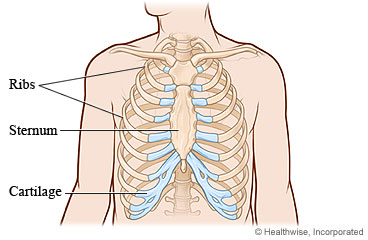Broken Rib: Care Instructions
Overview

A broken rib is a crack or break in one of the bones of the rib cage. Breathing can be very painful because
the muscles used for breathing pull on the rib.
In most cases, a broken rib will heal on its own. You can take pain medicine while the rib mends. Pain relief
allows you to take deep breaths. In the past, doctors recommended taping or wrapping broken ribs. This is no
longer done because taping makes it hard for you to take deep breaths. Taking deep breaths may help prevent
pneumonia or a partial collapse of a lung.
Your rib will heal in about 6 weeks.
You heal best when you take good care of yourself. Eat a variety of healthy foods, and don't smoke.
Follow-up care is a key part of your treatment and safety. Be sure to make and go to all
appointments, and call your doctor if you are having problems. It's also a good idea to know your test results
and keep a list of the medicines you take.
How can you care for yourself at home?
-
Be safe with medicines. Read and follow all instructions on the label.
-
If the doctor gave you a prescription medicine for pain, take it as prescribed.
-
If you are not taking a prescription pain medicine, ask your doctor if you can take an
over-the-counter medicine.
-
Even if it hurts, try to cough or take the deepest breath you can at least once every hour. This will get
air deeply into your lungs. This may reduce your chance of getting pneumonia or a partial collapse of a
lung. Hold a pillow against your chest to make this less painful.
-
Put ice or a cold pack on the area for 10 to 20 minutes at a time. Put a thin cloth between the ice and
your skin.
When should you call for help?
 Call 911
anytime you think you may need emergency care. For example, call if:
Call 911
anytime you think you may need emergency care. For example, call if:
Call your doctor now or seek immediate medical care if:
Watch closely for changes in your health, and be sure to contact your doctor if:
Current as of: July 17, 2023
Content Version: 14.0
Care instructions adapted under license by your
healthcare professional. If you have questions about a medical condition or this instruction, always ask
your healthcare professional. Healthwise, Incorporated disclaims any warranty or liability for your use of
this information.